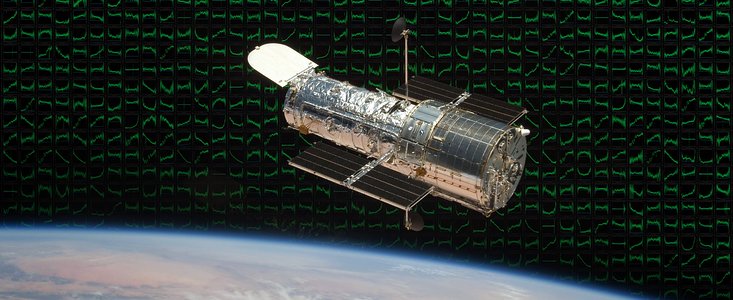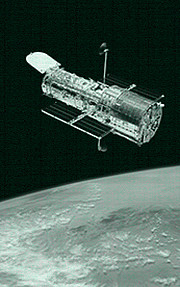Meddelelse
Space Telescope European Coordinating Facility to Close After 26 Successful Years
17. december 2010
The Space Telescope European Coordinating Facility, a unique collaboration between the European Space Agency (ESA) and the European Southern Observatory, will close on 31 December 2010 after 26 years. ESA’s continuing partnership with NASA on the Hubble mission ensures that European astronomers will continue to have access to observing time.
The Space Telescope European Coordinating Facility (ST-ECF), the scientific and technical co-ordination centre for the Hubble Space Telescope in Europe, will close its doors at the end of December 2010. This is part of a process in which the European Space Agency is streamlining its operations and concentrating astronomical operations, archiving and data reduction expertise at its European Space Astronomy Centre (ESAC) in Spain.
The ST-ECF was formed in 1984, six years before Hubble’s launch, as a key plank in ESA’s partnership with NASA and as a vital element in maximising Europe’s scientific return in the pre-internet age. Rather than simply contribute to Hubble science and technology programmes in the US, ESA made the strategic decision to build capabilities in Europe. As a result, the ST-ECF was formed as a joint venture between ESA and the European Southern Observatory (ESO), combining the technical and scientific expertise of both organisations.
The ST-ECF’s primary function has been as a support facility, both by contributing to the Hubble project and providing expertise and advice to European astronomers using Hubble. But this work has also had knock-on benefits elsewhere. ESO Director General, Tim de Zeeuw explains: “Establishing the ST-ECF within ESO allowed a very productive cross-fertilisation of ideas to take place. For example, the ST-ECF’s work on software, imaging and data archives have fed back into NASA’s work on Hubble. Conversely, the experience of being involved in Hubble gave ESO invaluable expertise for our Very Large Telescope.”
One area where the ST-ECF has made a particular impact is in astronomical image processing. In the early days, techniques were developed to counteract the effects of Hubble’s flawed mirror (deconvolution). This work subsequently evolved, in collaboration with NASA’s Space Telescope Science Institute (STScI), to use a combination of multiple, slightly displaced exposures (dithering) with a combination technique (drizzling) to greatly improve the imaging capability of the telescope. This work has proved very productive for astronomy in general, not just for Hubble.
In addition, staff at the ST-ECF made important advances in the modelling of the performance of various astronomical instruments. This theoretical knowledge lets astronomers create highly sophisticated computer simulations of the instruments, allowing for precise calibration of observations and more accurate results. This modelling work has provided substantial improvements in the scientific data produced by Hubble over the years.
The ST-ECF was also a pioneer of the early internet. Communication and co-ordination with NASA in the US and sharing data with astronomers across Europe meant that effective computer networking was key. To this end, the facility pioneered online access to scientific data archives, and set up one of the very first websites in Europe in the summer of 1993.
In the last few years, the ST-ECF has developed sophisticated software to exploit a capability that enables Hubble’s cameras to be used for the simultaneous spectroscopy of many sources in the field of view. Applied from a telescope in space this slitless spectroscopy is an enormously powerful technique to study the motions and properties of objects that are so faint that they cannot be reached in any other way.
A separate and very important contribution of the ST-ECF to the ESA Science Programme over many years has been its responsibility for developing communications and outreach in Europe for Hubble.
While the ST-ECF’s closure marks the end for one aspect of Hubble activities in Europe, ESA remains a firm partner to NASA in the space telescope’s continuing mission. To this end, ESA’s Science Programme Committee recently voted unanimously to extend the ESA contribution to the end of 2014, with a further extension possible.
Martin Kessler, head of ESA’s science operations department said: “European astronomers will have access to ESA’s share of observing time for as long as Hubble remains in the sky. Additionally, we expect to preserve access to Hubble data via the European Space Astronomy Centre. As part of the ongoing collaboration with NASA, ESA will continue to deploy staff based at the Space Telescope Science Institute in Baltimore, USA.”
ESO will continue to support the ESA public outreach effort for Hubble, processing images for public release, running the ESA/Hubble website at www.spacetelescope.org and producing the popular Hubblecast podcast series.
Links
Kontakter
Bob Fosbury
Head of Space Telescope European Coordinating Facility
Tel: +49 89 32 00 62 35
E-mail: rfosbury@eso.org
Martin Kessler
Head of ESA’s science operations department
European Space Astronomy Centre, Villanueva de la Cañada, Spain
Tel: +34-91-8131-253
E-mail: martin.kessler@esa.int
Markus Bauer
Science and Robotic Exploration Communication Officer
ESTEC (European Space Research and Technology Centre), Noordwijk, Netherlands
Tel: +31-71-565-6799
E-mail: Markus.Bauer@esa.int
Oli Usher
ESA/Hubble Public Information Officer
European Southern Observatory, Garching, Germany
Tel: +49-89-3200-6855
E-mail: ousher@eso.org
Om meddelelsen
| Id: | ann10101 |
Our use of Cookies
We use cookies that are essential for accessing our websites and using our services. We also use cookies to analyse, measure and improve our websites’ performance, to enable content sharing via social media and to display media content hosted on third-party platforms.
ESO Cookies Policy
The European Organisation for Astronomical Research in the Southern Hemisphere (ESO) is the pre-eminent intergovernmental science and technology organisation in astronomy. It carries out an ambitious programme focused on the design, construction and operation of powerful ground-based observing facilities for astronomy.
This Cookies Policy is intended to provide clarity by outlining the cookies used on the ESO public websites, their functions, the options you have for controlling them, and the ways you can contact us for additional details.
What are cookies?
Cookies are small pieces of data stored on your device by websites you visit. They serve various purposes, such as remembering login credentials and preferences and enhance your browsing experience.
Categories of cookies we use
Essential cookies (always active): These cookies are strictly necessary for the proper functioning of our website. Without these cookies, the website cannot operate correctly, and certain services, such as logging in or accessing secure areas, may not be available; because they are essential for the website’s operation, they cannot be disabled.
Functional Cookies: These cookies enhance your browsing experience by enabling additional features and personalization, such as remembering your preferences and settings. While not strictly necessary for the website to function, they improve usability and convenience; these cookies are only placed if you provide your consent.
Analytics cookies: These cookies collect information about how visitors interact with our website, such as which pages are visited most often and how users navigate the site. This data helps us improve website performance, optimize content, and enhance the user experience; these cookies are only placed if you provide your consent. We use the following analytics cookies.
Matomo Cookies:
This website uses Matomo (formerly Piwik), an open source software which enables the statistical analysis of website visits. Matomo uses cookies (text files) which are saved on your computer and which allow us to analyze how you use our website. The website user information generated by the cookies will only be saved on the servers of our IT Department. We use this information to analyze www.eso.org visits and to prepare reports on website activities. These data will not be disclosed to third parties.
On behalf of ESO, Matomo will use this information for the purpose of evaluating your use of the website, compiling reports on website activity and providing other services relating to website activity and internet usage.
Matomo cookies settings:
Additional Third-party cookies on ESO websites: some of our pages display content from external providers, e.g. YouTube.
Such third-party services are outside of ESO control and may, at any time, change their terms of service, use of cookies, etc.
YouTube: Some videos on the ESO website are embedded from ESO’s official YouTube channel. We have enabled YouTube’s privacy-enhanced mode, meaning that no cookies are set unless the user actively clicks on the video to play it. Additionally, in this mode, YouTube does not store any personally identifiable cookie data for embedded video playbacks. For more details, please refer to YouTube’s embedding videos information page.
Cookies can also be classified based on the following elements.
Regarding the domain, there are:
- First-party cookies, set by the website you are currently visiting. They are stored by the same domain that you are browsing and are used to enhance your experience on that site;
- Third-party cookies, set by a domain other than the one you are currently visiting.
As for their duration, cookies can be:
- Browser-session cookies, which are deleted when the user closes the browser;
- Stored cookies, which stay on the user's device for a predetermined period of time.
How to manage cookies
Cookie settings: You can modify your cookie choices for the ESO webpages at any time by clicking on the link Cookie settings at the bottom of any page.
In your browser: If you wish to delete cookies or instruct your browser to delete or block cookies by default, please visit the help pages of your browser:
Please be aware that if you delete or decline cookies, certain functionalities of our website may be not be available and your browsing experience may be affected.
You can set most browsers to prevent any cookies being placed on your device, but you may then have to manually adjust some preferences every time you visit a site/page. And some services and functionalities may not work properly at all (e.g. profile logging-in, shop check out).
Updates to the ESO Cookies Policy
The ESO Cookies Policy may be subject to future updates, which will be made available on this page.
Additional information
For any queries related to cookies, please contact: pdprATesoDOTorg.
As ESO public webpages are managed by our Department of Communication, your questions will be dealt with the support of the said Department.


